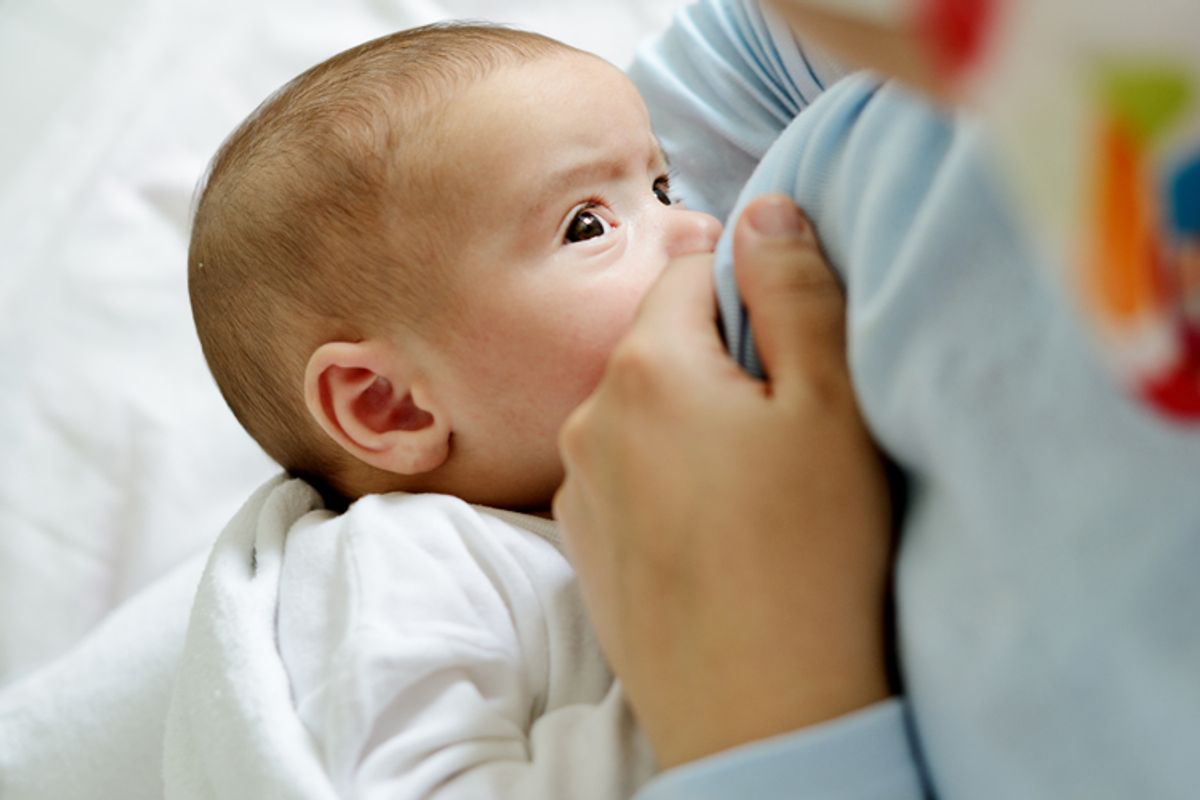Despite decades of campaigns encouraging new mothers that breast-feeding is best for babies, here in the Western world, the rates at which mothers nurse are still remarkably low. Could the solution be to throw a little money at the issue?
In the U.S., only 29 percent of mothers breast-feed exclusively the first six months of their babies' lives. And the figures are even more dramatic in the U.K., where this year breast-feeding rates have declined for the first time in almost a decade. By the time a baby reaches the six- or eight-week mark, fewer than half of all U.K. mothers there are breast-feeding exclusively. In June, the Royal College of Midwives raised concerns about the dropoff, and noted a dwindling support for nursing mothers. Two years ago, the British government scrapped its National Breastfeeding Awareness Week, and the National Health Service has been slashing pre- and postpartum care programs for women. Now, a Sheffield University research program is hoping to do something to reverse the trend. But plenty of critics are questioning whether it's a meaningful incentive or outright "bribery."
The initiative will focus on women in lower-income areas, where breast-feeding rates are especially low and the practice is often still considered embarrassing and taboo -- even in private. As Mary Renfrew, a professor of mother and infant health at Dundee University, told the Guardian Monday, "Women have even told us it is immoral because breasts have been very sexualized. They think they might be open to the gaze of people who think they are doing something wrong." In an attempt to "increase the perceived value of breastfeeding," the government-funded program is offering women shopping vouchers to give nursing a try. Mothers can receive £120 in vouchers if they breast-feed for six weeks, and a bonus £80 if they're still breast-feeding at six months. Similar programs have been launched to encourage parents to vaccinate their children, with government benefits paid out to families that meet immunization requirements.
Writing in the Telegraph Tuesday, Louisa Symington-Mills called the plan "loathsome" and said "it would be a better use of NHS funds to increase investment in ante and post natal care services." Sky News called it "demeaning" and said, "The people who came up with this pilot scheme have fundamentally failed to understand the pressures and difficulties that many new mothers are under with regards to feeding their babies." And the Royal College of Midwives said in a statement that "The motive for breastfeeding cannot be rooted by offering financial reward. It has to be something that a mother wants to do in the interest of the health and well-being of her child."
That's all well and good, but for families living in economic distress, financial reward is very much in the interest of a child's well-being. And for mothers who need to return to work right away, who don't have access to on-site nursing suites and expensive breast pumps, the pressure not to nurse is strong. Throw in the social stigma that is more prevalent in poorer economic classes, and financial reward might well motivate a family on the practical level that a pamphlet about the long-term benefits of breast-feeding would not.
Every mother and child should have access to breast-feeding information, support and guidance. Every family should have the tools to make breast-feeding as practical as possible, especially for women who work. And we definitely need to do a whole lot better in our hypersexualized world to create a culture that recognizes that there is nothing offensive about a woman feeding her damn baby. All of those are long-term goals the NHS should not lose sight of. But as an experiment, targeted to a small number of mothers in a limited geographic area whose babies will be born in the months to come, isn't it worth exploring whether there are actions that can work, right now, to encourage breast-feeding? Isn't it worth seeing, however they're initially motivated, whether mothers who otherwise wouldn't breast-feed at all might discover that nursing can be cheap and easy and very nice – and whether they can then encourage their friends to do likewise? The experience of nursing isn't sullied by its motivation. And a baby doesn't care if his mother is just doing it for the Tesco voucher.



Shares